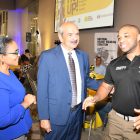If the organisers of Science Genius Jamaica: Science Meets Dancehall realise their vision, Jamaica will shortly become a production hub for some of the world’s greatest scientists.
Through a partnership between the Jamaica National Foundation and Science Genius — a US-based initiative that uses hip-hop music to reach students, the programme was launched Wednesday at the Knutsford Court Hotel with an aim to “create a buzz about science among high school students”. It will use dancehall music to educate and generate interest in science, technology, engineering and mathematics (STEM) subjects in Jamaica.
According to Dr Renee Rattray, senior manager of learning, development, and culture at the JN Group, this will be implemented in the form of a competition in which students from across the island will vie for the opportunity to be named Science Genius of Jamaica.
“It’s JN Foundation’s latest education initiative. We’re about changing paradigms and shifting things up and this is a part of the education revolution. We’re wanting to turn the whole notion of science and mathematics being hard and being something that students cannot relate to, to something that is easy, and we figured that pairing music with that would be one of the best ways to do this,” Dr Rattray told the Jamaica Observer on Wednesday.
She explained that the students, guided by their teachers and music mentors Tifa, Wayne Marshall and other artistes, will write science-themed dancehall songs for the competition. The five best schools and five top individual students will move on to the final round of clashes, aptly termed BATTLES (Bringing Attention to Transforming Teaching, Learning and Engagement in Science) for the crowning of the winner.
Teachers and students will compete for cash, laptops, and other prizes, while the winning school will receive funds for its science labs.
“It kicks off today (Wednesday),” Rattray revealed. “They have to go away and do a video to say why they want to be a part of the programme and then we’re going to shortlist 20 schools and then we kick the project off from there and the final will be sometime at the end of May or early June.”
The project targets grade nine students.
“You’re going to have to immerse yourselves in the science content and then our mentors Tifa and Wayne will come around with some other music geniuses to support you as you develop your lyrics. They will train you about how to write good lyrics. We want deep meaningful content and we’re really excited because we know you can do it. We’re setting the bar really high because that’s how we do,” Dr Rattray told students.
“Ultimately, we’re just going to be turning this whole education business on its head. This is just one area we’re going to be a part of and it’s going to be cool,” she added.
Sceince Genius was developed by Dr Christopher Emdin, associate professor in the Department of Mathematics, Science, and Technology at Teachers College, Columbia University. Dr Emdin holds a PhD in Urban Education with a concentration in mathematics, science, and technology; Master’s degrees in both natural sciences and education administration, and Bachelor’s degrees in physical anthropology, biology, and chemistry.
On Wednesday he expressed his hope for Science Genius Jamaica.
“We are at a point in time in the history of this world, not just in Jamaica, where folks of colour who’ve been traditionally moved to the margins have become so much more central than ever before; whether we’re talking about the United States or we’re talking about the Caribbean or we’re talking about Europe.”
“What’s been happening is that folks who for a very long time were being told that they lack intelligence, or they lack brilliance, or that their culture lacks value are getting to the point where they’re saying, ‘No, and we’re gonna redefine who we are’. This moment today (Wednesday) really exemplifies that because in many ways we are pushing back against a schooling sytem and a set of traditions that you might not want me to say but in reality is the remnants of a dying colonial imperialism,” the professor said to resounding shouts and applause.
Seeking to dispel the suggestion that Science Genius Jamaica is just “a cool idea”, the professor pointed out that the project is a movement showing the reclamation of people’s brilliance. Making his case, Edmin made reference to the many in New York who he said doubted his efforts, but who are now astonished at its success.
“What we’re doing now is we’re showing people that intellectual abilities exist in low places as well as high places. The passion for the work exists in those places as well; all we had to do was allow the young folks to be able to do it on their own terms in their own culture,” he stated, pointing out that the project was implemented in communities where students were deemed unteachable and without ability.
“When you start marrying dancehall to science — and people say dancehall is a negative culture only interested in bleaching and celebration — what happens is that you are engaging the most cutting edge research based on what we know about neuro-plasticity; because by merging dancehall with science you are retraining the brains of youths who are embedded in dancehall to reimagine themselves as scientists,” stated the professor.
“At the end of it not only will we change science but we will change dancehall. We don’t wanna change dancehall to change the core and beauty of it, we want to expand dancehall to make intelligence cool again,” Emdin continued.
Local entertainers and government ministers were excited at Wednesday’s launch.
“As the minister and also a scientist, I thank the Jamaica National Foundation Group (JN Group) and its Foundation for setting an excellent precedence in public/private sector partnership in assisting in the rescue mission of science and mathematics in Jamaica,” said Minister of Science, Energy and Technology Dr Andrew Wheatley. “Let me thank you for your efforts in birthing the new generation of scientists, mathematicians, statisticians, engineers, botanists.”
His colleague, Floyd Green, state minister in the Ministry of Education, Youth and Information, in a rendition of a popular Bounty Killa song, encouraged students to “pressure unu book”.
“I really want to congratulate and commend the JN Foundation. Not only have they stepped outside of the box, they have removed the box completely and that is what is needed if we’re going to be successful in our education project,” he said.
“I think we all recognise now in education that no one cap fits all, no one size fits all. You have to take different approaches if we’re going to truly connect with our students,” he added.
Green, who highlighted the impact of dancehall on people the world over, was happy it is now being used to treat a challenge the country has faced for many years — that of low performance in STEM subjects.
“Our teachers will tell you (that) maths and the sciences are often shied away from in our society because it has significant volume of work. Oftentimes there is a mental block that you can’t get it right and I believe that one way to break down that mental barrier is present it in a fashion that again is innate and will resonate. So, instead of saying, ‘Dem young people yah know every song; dem can deejay every chune’, give them some lyrics that when them deejay it it is putting in their mind the knowledge that we need them to have,” Green urged.
Mentors Tifa and Wayne Marshall also expressed fusion of dancehall and science.
“I’m so happy to give back to the youth. I love edutaining, I love giving back to the youth, I love sharing my experience and I love showing people that not everything in dancehall is negative; you do have good people in dancehall,” Tifa said.
She encouraged teachers to keep an open mind as students create their pieces.
Said Marshall: “It (Emdin’s work) was very interesting, very unique. Chris Emdin is very passionate about educating and science and reaching children who are less expected be scientists, and I think anything to carry these great minds back to being an intellectual I’m there, I’m all for it.”
“I started thinking about that and I started writing lyrics, so I wrote a little verse…because I was thinking it might be difficult for the kids, but when I start thinking about it I realise it nah go be difficult. All it’s going to do is force them to mix something that they love passionately and they associate themselves with every day, to the science and it will bring them closer to science and learning.”
See the original article here!




